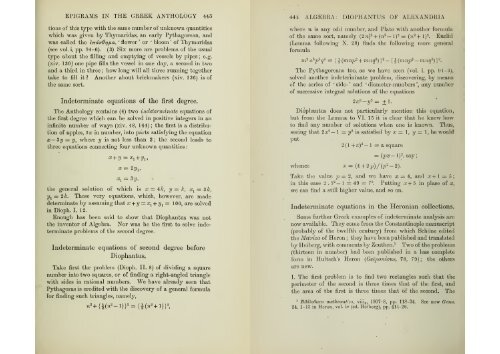A history of Greek mathematics Vol.II from Aristarchus to Diophantus by Heath, Thomas Little, Sir, 1921
MACEDONIA is GREECE and will always be GREECE- (if they are desperate to steal a name, Monkeydonkeys suits them just fine) ΚΑΤΩ Η ΣΥΓΚΥΒΕΡΝΗΣΗ ΤΩΝ ΠΡΟΔΟΤΩΝ!!! ΦΕΚ,ΚΚΕ,ΚΝΕ,ΚΟΜΜΟΥΝΙΣΜΟΣ,ΣΥΡΙΖΑ,ΠΑΣΟΚ,ΝΕΑ ΔΗΜΟΚΡΑΤΙΑ,ΕΓΚΛΗΜΑΤΑ,ΔΑΠ-ΝΔΦΚ, MACEDONIA,ΣΥΜΜΟΡΙΤΟΠΟΛΕΜΟΣ,ΠΡΟΣΦΟΡΕΣ,ΥΠΟΥΡΓΕΙΟ,ΕΝΟΠΛΕΣ ΔΥΝΑΜΕΙΣ,ΣΤΡΑΤΟΣ, ΑΕΡΟΠΟΡΙΑ,ΑΣΤΥΝΟΜΙΑ,ΔΗΜΑΡΧΕΙΟ,ΝΟΜΑΡΧΙΑ,ΠΑΝΕΠΙΣΤΗΜΙΟ,ΛΟΓΟΤΕΧΝΙΑ,ΔΗΜΟΣ,LIFO,ΛΑΡΙΣΑ, ΠΕΡΙΦΕΡΕΙΑ,ΕΚΚΛΗΣΙΑ,ΟΝΝΕΔ,ΜΟΝΗ,ΠΑΤΡΙΑΡΧΕΙΟ,ΜΕΣΗ ΕΚΠΑΙΔΕΥΣΗ,ΙΑΤΡΙΚΗ,ΟΛΜΕ,ΑΕΚ,ΠΑΟΚ,ΦΙΛΟΛΟΓΙΚΑ,ΝΟΜΟΘΕΣΙΑ,ΔΙΚΗΓΟΡΙΚΟΣ,ΕΠΙΠΛΟ, ΣΥΜΒΟΛΑΙΟΓΡΑΦΙΚΟΣ,ΕΛΛΗΝΙΚΑ,ΜΑΘΗΜΑΤΙΚΑ,ΝΕΟΛΑΙΑ,ΟΙΚΟΝΟΜΙΚΑ,ΙΣΤΟΡΙΑ,ΙΣΤΟΡΙΚΑ,ΑΥΓΗ,ΤΑ ΝΕΑ,ΕΘΝΟΣ,ΣΟΣΙΑΛΙΣΜΟΣ,LEFT,ΕΦΗΜΕΡΙΔΑ,ΚΟΚΚΙΝΟ,ATHENS VOICE,ΧΡΗΜΑ,ΟΙΚΟΝΟΜΙΑ,ΕΝΕΡΓΕΙΑ, ΡΑΤΣΙΣΜΟΣ,ΠΡΟΣΦΥΓΕΣ,GREECE,ΚΟΣΜΟΣ,ΜΑΓΕΙΡΙΚΗ,ΣΥΝΤΑΓΕΣ,ΕΛΛΗΝΙΣΜΟΣ,ΕΛΛΑΔΑ, ΕΜΦΥΛΙΟΣ,ΤΗΛΕΟΡΑΣΗ,ΕΓΚΥΚΛΙΟΣ,ΡΑΔΙΟΦΩΝΟ,ΓΥΜΝΑΣΤΙΚΗ,ΑΓΡΟΤΙΚΗ,ΟΛΥΜΠΙΑΚΟΣ, ΜΥΤΙΛΗΝΗ,ΧΙΟΣ,ΣΑΜΟΣ,ΠΑΤΡΙΔΑ,ΒΙΒΛΙΟ,ΕΡΕΥΝΑ,ΠΟΛΙΤΙΚΗ,ΚΥΝΗΓΕΤΙΚΑ,ΚΥΝΗΓΙ,ΘΡΙΛΕΡ, ΠΕΡΙΟΔΙΚΟ,ΤΕΥΧΟΣ,ΜΥΘΙΣΤΟΡΗΜΑ,ΑΔΩΝΙΣ ΓΕΩΡΓΙΑΔΗΣ,GEORGIADIS,ΦΑΝΤΑΣΤΙΚΕΣ ΙΣΤΟΡΙΕΣ, ΑΣΤΥΝΟΜΙΚΑ,ΦΙΛΟΣΟΦΙΚΗ,ΦΙΛΟΣΟΦΙΚΑ,ΙΚΕΑ,ΜΑΚΕΔΟΝΙΑ,ΑΤΤΙΚΗ,ΘΡΑΚΗ,ΘΕΣΣΑΛΟΝΙΚΗ,ΠΑΤΡΑ, ΙΟΝΙΟ,ΚΕΡΚΥΡΑ,ΚΩΣ,ΡΟΔΟΣ,ΚΑΒΑΛΑ,ΜΟΔΑ,ΔΡΑΜΑ,ΣΕΡΡΕΣ,ΕΥΡΥΤΑΝΙΑ,ΠΑΡΓΑ,ΚΕΦΑΛΟΝΙΑ, ΙΩΑΝΝΙΝΑ,ΛΕΥΚΑΔΑ,ΣΠΑΡΤΗ,ΠΑΞΟΙ
MACEDONIA is GREECE and will always be GREECE- (if they are desperate to steal a name, Monkeydonkeys suits them just fine)
ΚΑΤΩ Η ΣΥΓΚΥΒΕΡΝΗΣΗ ΤΩΝ ΠΡΟΔΟΤΩΝ!!!
ΦΕΚ,ΚΚΕ,ΚΝΕ,ΚΟΜΜΟΥΝΙΣΜΟΣ,ΣΥΡΙΖΑ,ΠΑΣΟΚ,ΝΕΑ ΔΗΜΟΚΡΑΤΙΑ,ΕΓΚΛΗΜΑΤΑ,ΔΑΠ-ΝΔΦΚ, MACEDONIA,ΣΥΜΜΟΡΙΤΟΠΟΛΕΜΟΣ,ΠΡΟΣΦΟΡΕΣ,ΥΠΟΥΡΓΕΙΟ,ΕΝΟΠΛΕΣ ΔΥΝΑΜΕΙΣ,ΣΤΡΑΤΟΣ, ΑΕΡΟΠΟΡΙΑ,ΑΣΤΥΝΟΜΙΑ,ΔΗΜΑΡΧΕΙΟ,ΝΟΜΑΡΧΙΑ,ΠΑΝΕΠΙΣΤΗΜΙΟ,ΛΟΓΟΤΕΧΝΙΑ,ΔΗΜΟΣ,LIFO,ΛΑΡΙΣΑ, ΠΕΡΙΦΕΡΕΙΑ,ΕΚΚΛΗΣΙΑ,ΟΝΝΕΔ,ΜΟΝΗ,ΠΑΤΡΙΑΡΧΕΙΟ,ΜΕΣΗ ΕΚΠΑΙΔΕΥΣΗ,ΙΑΤΡΙΚΗ,ΟΛΜΕ,ΑΕΚ,ΠΑΟΚ,ΦΙΛΟΛΟΓΙΚΑ,ΝΟΜΟΘΕΣΙΑ,ΔΙΚΗΓΟΡΙΚΟΣ,ΕΠΙΠΛΟ, ΣΥΜΒΟΛΑΙΟΓΡΑΦΙΚΟΣ,ΕΛΛΗΝΙΚΑ,ΜΑΘΗΜΑΤΙΚΑ,ΝΕΟΛΑΙΑ,ΟΙΚΟΝΟΜΙΚΑ,ΙΣΤΟΡΙΑ,ΙΣΤΟΡΙΚΑ,ΑΥΓΗ,ΤΑ ΝΕΑ,ΕΘΝΟΣ,ΣΟΣΙΑΛΙΣΜΟΣ,LEFT,ΕΦΗΜΕΡΙΔΑ,ΚΟΚΚΙΝΟ,ATHENS VOICE,ΧΡΗΜΑ,ΟΙΚΟΝΟΜΙΑ,ΕΝΕΡΓΕΙΑ, ΡΑΤΣΙΣΜΟΣ,ΠΡΟΣΦΥΓΕΣ,GREECE,ΚΟΣΜΟΣ,ΜΑΓΕΙΡΙΚΗ,ΣΥΝΤΑΓΕΣ,ΕΛΛΗΝΙΣΜΟΣ,ΕΛΛΑΔΑ, ΕΜΦΥΛΙΟΣ,ΤΗΛΕΟΡΑΣΗ,ΕΓΚΥΚΛΙΟΣ,ΡΑΔΙΟΦΩΝΟ,ΓΥΜΝΑΣΤΙΚΗ,ΑΓΡΟΤΙΚΗ,ΟΛΥΜΠΙΑΚΟΣ, ΜΥΤΙΛΗΝΗ,ΧΙΟΣ,ΣΑΜΟΣ,ΠΑΤΡΙΔΑ,ΒΙΒΛΙΟ,ΕΡΕΥΝΑ,ΠΟΛΙΤΙΚΗ,ΚΥΝΗΓΕΤΙΚΑ,ΚΥΝΗΓΙ,ΘΡΙΛΕΡ, ΠΕΡΙΟΔΙΚΟ,ΤΕΥΧΟΣ,ΜΥΘΙΣΤΟΡΗΜΑ,ΑΔΩΝΙΣ ΓΕΩΡΓΙΑΔΗΣ,GEORGIADIS,ΦΑΝΤΑΣΤΙΚΕΣ ΙΣΤΟΡΙΕΣ, ΑΣΤΥΝΟΜΙΚΑ,ΦΙΛΟΣΟΦΙΚΗ,ΦΙΛΟΣΟΦΙΚΑ,ΙΚΕΑ,ΜΑΚΕΔΟΝΙΑ,ΑΤΤΙΚΗ,ΘΡΑΚΗ,ΘΕΣΣΑΛΟΝΙΚΗ,ΠΑΤΡΑ, ΙΟΝΙΟ,ΚΕΡΚΥΡΑ,ΚΩΣ,ΡΟΔΟΣ,ΚΑΒΑΛΑ,ΜΟΔΑ,ΔΡΑΜΑ,ΣΕΡΡΕΣ,ΕΥΡΥΤΑΝΙΑ,ΠΑΡΓΑ,ΚΕΦΑΛΟΝΙΑ, ΙΩΑΝΝΙΝΑ,ΛΕΥΚΑΔΑ,ΣΠΑΡΤΗ,ΠΑΞΟΙ
You also want an ePaper? Increase the reach of your titles
YUMPU automatically turns print PDFs into web optimized ePapers that Google loves.
EPIGRAMS IN THE GREEK ANTHOLOGY 443<br />
+{ 1(71 1)} 2 +1)}2j<br />
1<br />
Biblioiheca mathematlca, viii s , 1907-8, pp. 118-34. See now Geom.<br />
2A. 1-13 in Heron, vol. iv (ed. Heiberg), pp. 414-26.<br />
444 ALGEBRA: DIOPHANTUS OF ALEXANDRIA<br />
fcions <strong>of</strong> this type with the same number <strong>of</strong> unknown quantities<br />
where n is any odd number, and Pla<strong>to</strong> with another formula<br />
which was given <strong>by</strong> Thymaridas, an early Pythagorean, and<br />
<strong>of</strong> the same sort, namely (2n) 2 + (n — 2 l) = 2 (n 2 +\) 2 . Euclid<br />
was called the e7rdu0rj/xa, flower ' ' or bloom ' ' <strong>of</strong> Thymaridas<br />
(Lemma following X. 28) finds the following more general<br />
(see vol. i, pp. 94-6). (3) Six more are problems <strong>of</strong> the usual<br />
formula<br />
type about the filling and emptying <strong>of</strong> vessels <strong>by</strong> pipes ; e.g.<br />
(xiv. 130) one pipe fills the vessel in one day, a second in two<br />
m 2 u 2 p 2 q<br />
= 2 { \ (mnp 2 + mnq 2 2<br />
—<br />
) } { \ (mnp 2 — mnq 2 )<br />
2<br />
.<br />
and a third in three ; how long will all three running <strong>to</strong>gether<br />
The Pythagoreans <strong>to</strong>o, as we have seen (vol. i, pp. 91-3),<br />
take <strong>to</strong> fill it? Another about brickmakers (xiv. 136) is <strong>of</strong><br />
solved another indeterminate problem, discovering, <strong>by</strong> means<br />
the same sort.<br />
<strong>of</strong> the series <strong>of</strong> side- ' ' and diameter-numbers ' ', any number<br />
Indeterminate equations <strong>of</strong> the first degree.<br />
<strong>of</strong> successive integral solutions <strong>of</strong> the equations<br />
2x 2 2<br />
— y<br />
= + 1.<br />
The Anthology contains (4) two indeterminate equations <strong>of</strong><br />
<strong>Diophantus</strong> does not particularly mention this equation,<br />
the first degree which can be solved in positive integers in an<br />
but <strong>from</strong> the Lemma <strong>to</strong> VI. 15 it is clear that he knew how<br />
infinite number <strong>of</strong> ways (xiv. 48, 144) ; the first is a distribution<br />
<strong>of</strong> apples, 3x in number, in<strong>to</strong> parts satisfying the equation<br />
seeing that 2 x 2 —<br />
<strong>to</strong> find any number <strong>of</strong> solutions when one is known. Thus,<br />
2 1 = y is satisfied <strong>by</strong> x = 1 , y == 1 , he would<br />
x — Sy = y t<br />
where y is not less than 2 ; the second leads <strong>to</strong><br />
put<br />
three equations connecting four unknown quantities<br />
2 ( 1 + x) 2 — 1 = a. square<br />
x + y = x x + yu<br />
= (px-1) 2 , say;<br />
x=<br />
whence x = (4 +<br />
2yv<br />
2p)/(p 2 -2).<br />
x 1<br />
= Take the value 3y,<br />
p — 2, and we have x = 4, and x+ I = 5 ;<br />
in this case 2 . 5 — 2 1 = 49 = 7 2 . Putting x + 5 in place <strong>of</strong> x,<br />
the general solution <strong>of</strong> which is x = 4&, y — k, x x<br />
= 3 k,<br />
we can find a still higher value, and so on.<br />
= 2 k. These very equations, which, however, are<br />
y1<br />
made<br />
determinate <strong>by</strong> assuming that x + y = x 1 + y 1<br />
— 100, are solved<br />
Indeterminate equations in the Heronian collections.<br />
in Dioph. I. 12.<br />
Enough has been said <strong>to</strong> show that <strong>Diophantus</strong> was not<br />
Some further <strong>Greek</strong> examples <strong>of</strong> indeterminate analysis are<br />
the inven<strong>to</strong>r <strong>of</strong> Algebra. Nor was he the first <strong>to</strong> solve indeterminate<br />
now available. They come <strong>from</strong> the Constantinople manuscript<br />
problems <strong>of</strong> the second degree.<br />
(probably <strong>of</strong> the twelfth century) <strong>from</strong> which Schone edited<br />
the Metrica <strong>of</strong> Heron ; they have been published and translated<br />
Indeterminate equations <strong>of</strong> second degree<br />
<strong>by</strong> Heiberg, with comments <strong>by</strong> Zeuthen. 1<br />
Two <strong>of</strong> the problems<br />
before<br />
(thirteen in number) had been published in a less complete<br />
<strong>Diophantus</strong>.<br />
form in Hultsch's Heron (Geeponicus, 78, 79)<br />
; the others<br />
Take first the problem (Dioph. <strong>II</strong>. 8) <strong>of</strong> dividing a square<br />
are new.<br />
number in<strong>to</strong> two squares, or <strong>of</strong> finding a right-angled triangle<br />
I. The first problem is <strong>to</strong> find two rectangles such that the<br />
with sides in rational numbers. We have already seen that<br />
perimeter <strong>of</strong> the second is three times that <strong>of</strong> the first, and<br />
Pythagoras is credited with the discovery <strong>of</strong> a general formula<br />
for finding such triangles, namely,<br />
^ 2_ ={ 1^2<br />
the area <strong>of</strong> the first is three times that <strong>of</strong> the second. The

















